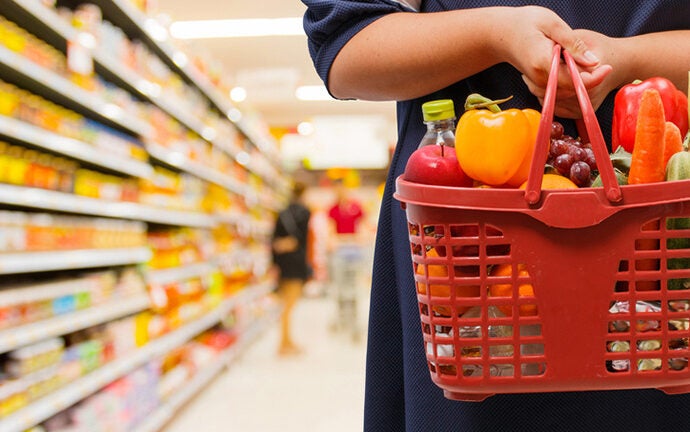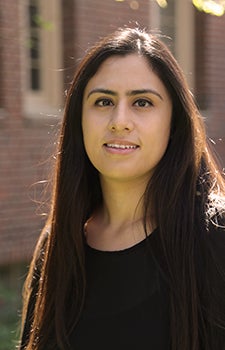
Virtual Food Pantry helps ensure all USC students get enough to eat
It seems like a classic scenario of the college experience: after a long day of classes, friends going out to get a pizza together. But for a growing number of college students, this represents a luxury beyond their financial means.
More and more, food insecurity has become a problem on college campuses, due in part to the rising costs of higher education. Tuition at USC, for example, will increase 3.9 percent for the 2017-18 school year. And myriad other expenses associated with university life also continue to rise.
According to a recent study by the National Student Campaign Against Hunger and Homelessness — involving nearly 4,000 students from both four-year colleges and community colleges in 12 states — 48 percent of participants reported food insecurity in the past month, with students of color disproportionately affected.
In an effort to address this trend, last fall the USC Dornsife Office of Diversity and Strategic Initiatives (ODSI) created a Virtual Food Pantry for food-insecure students. It came to fruition thanks to an initial donation of $20,000 by University Professor Leo Braudy, Leo S. Bing Chair in English and American Literature and professor of English, art history and history, and his wife, Dorothy.
The pantry program was piloted for low-income students associated with the Norman Topping Student Aid Fund and Trojan Guardian Scholars. In February, the Office of Diversity and Strategic Initiatives partnered with USC Campus Activities to launch the program university-wide, with additional funding coming from the Undergraduate and Graduate Student Governments.
Help when it’s needed most
The Virtual Food Pantry allows students to obtain a $25 Ralph’s gift card up to three times per semester in exchange for completing a confidential intake form. The program’s goals include creating food access, gathering related student data to help understand the scope of the problem, and connecting students in need with a financial aid representative and budgeting tools. So far more than 50 individuals have received help from the pantry.

Junior Carmen Noyola, who benefited from the Virtual Food Pantry last fall. Photo by Mike Glier.
Junior Carmen Noyola, a first-generation college student majoring in NGOs and social change, has benefited from the program. The former foster youth — and single mother — works 20 hours a week on campus in addition to being a full-time student. Her income from work is not enough to make ends meet so she receives government support to help pay the bills and rent for the apartment she shares with her son. She was excited to learn about the virtual food pantry through her contacts in the Trojan Guardian Scholars program.
Between classes, work and caring for her son, Noyola said, her day is densely scheduled. If she doesn’t have time to pack a lunch or go grocery shopping at the supermarket, she doesn’t get to eat while she’s on campus. Other issues beyond her control can also create challenges.
“The food pantry really came in handy because [this fall] I got cut off from my food stamps two times,” she said. “They don’t really tell you; they just do it. Then suddenly you realize, ‘Oh no, I can’t purchase food.’”
In both cases the problem resulted from a misfiling of the necessary paperwork by Noyola’s case worker.
“The food pantry was vital to me,” Noyola said. “They gave me a Ralph’s card so I was able to buy groceries and cook at home for my son and I.”
Helping in creative ways
Data collected this fall by the Office of Diversity and Strategic Initiatives showed that 40 percent of students using the Virtual Food Pantry were repeat visitors, indicating that food insecurity is an ongoing problem for them.
Last year, the Braudys — who have donated to the USC Good Neighbors Campaign over the years — read a news article about the issue of food insecurity on college campuses nationally, and among first-generation students in particular, and they wanted to do something about it.

University Professor Leo Braudy and his wife, Dorothy. Photo by Phil Channing.
“We wanted to do more, but we didn’t want to put our name on a fountain or something,” Dorothy said. “Not a scholarship, but something more specific. We wanted to do something directly for students that could help them immediately.”
They worked with ODSI to make their donation and get the Virtual Food Pantry off the ground.
“We’re proud to continue contributing to this important fund,” Leo said. “I’m always trying to get my colleagues to contribute to the Good Neighbors Campaign. People think that their little bit doesn’t make a difference, but it’s valuable to find out where the holes are and how they might be filled.”
The Braudys were awarded with the 2017 Community Leadership Award for their donation, and Noyola herself presented the award at the First Generation College Student Summit in early February.
“It was especially great to hear some anecdotes from the various students, including Carmen, about how the pantry had specifically helped them,” Leo said. “I hope [our gift] encourages other donors of lesser means like us to think creatively about where they might be able to help.”